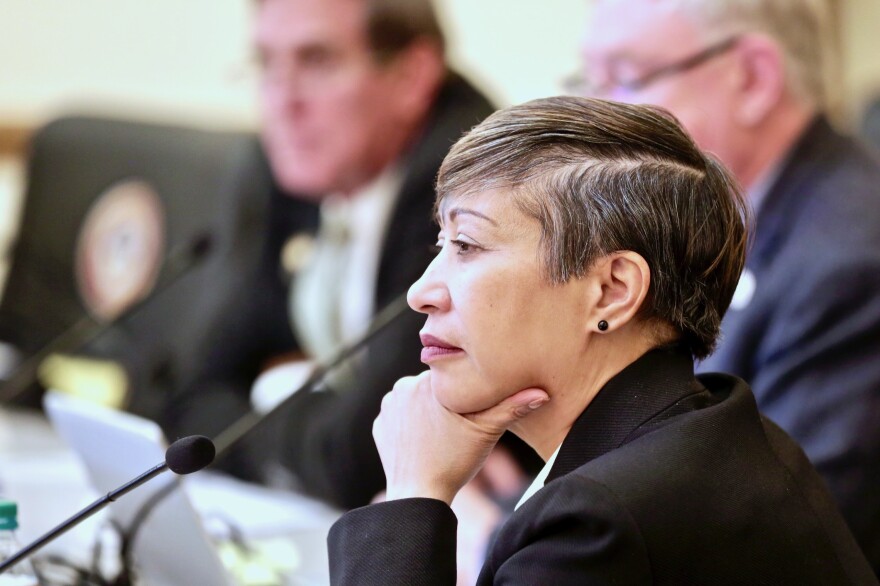The death penalty, and whether to repeal it, is likely to be one of the weightiest topics Colorado's legislature will debate this session and advocates believe this is the best chance they've had in years to abolish it. It's on the legislative agenda across the country and California's Gov. Gavin Newsom last week put a moratorium on the death penalty.
Democrats, who are pushing for the repeal, hold the majority in the Colorado statehouse.
Yet, for Democratic state Sen. Rhonda Fields, the death penalty is not just a question of policy. Of the three men on death row in the state, two are there for the murder of her son Javad Marshall Fields and his fiancée, Vivian Wolfe. They were killed days before Javad was set to testify as a witness in a murder trial.
"It's just a part of my experience," Fields says. "It's a part of who I am as a lawmaker. It's a constant pain I live with every day. It's something that you ... don't get over, you just live through."
And when it comes to repealing the death penalty, Fields will be voting against the majority of her party. As it's written, the bill would apply only to future cases, but the new Democratic governor, Jared Polis, told Colorado Public Radio he would take the bill's passing as a strong indication that those on death row should have their sentences commuted to life in prison.
"What kind of justice is that for Javad and Vivian who were doing their civic responsibility by cooperating with the police?" asks Fields. "Their whole future was ahead of them and they were ambushed and murdered."
Fields isn't alone in that thinking. Democratic Rep. Tom Sullivan's son, Alex, was one of the 12 people murdered in the 2012 Aurora theater shooting. Sullivan supported prosecutors' push for the death penalty for James Holmes. Even though a jury ultimately decided against it, Sullivan said he's glad it was an option. He doesn't want to tell any other family in a similar situation that they can't seek what they feel is justice.

"Even after the fact there was no remorse from what he had done," Sullivan says of Holmes. "There's every indication if he were to have another chance at this, he would try to do it again. We have a mechanism if those people don't want to be a part of our society; we should have the ability to take those people out of our society."
Democratic bill sponsor Sen. Angela Williams is aware of her colleagues' personal reasons for supporting the death penalty but remains unswayed by their arguments.
"I'm approaching this with all due respect in the situation that [Fields] and Tom Sullivan have been in."
Williams believes the death penalty is too costly, and immoral. She's Catholic and says her religious faith has played a big role in her decision. She also feels it is not applied fairly. As a black woman, she worries for her son and other people of color.
"The three men who are African-American that sit on death row now — they are all from Arapahoe County. They all went to the same high school," Williams says. "Where you live and the color of your skin and how much money you have depends whether or not you get the death penalty."
In Colorado, it's been rare for prosecutors to seek the death penalty and even more rare for juries to impose it. The state has only executed one person since the U.S. Supreme Court reinstated capital punishment in 1976: Gary Lee Davis in 1997.

Democrats have a slim majority in the Senate. With Fields and other Democrats waivering, they could need some GOP votes to pass the repeal.
If it makes it to the House, the bill will be on firmer footing; Democrats have a wider edge in that chamber. Yet, some of those members are grappling with what to do, too. Democratic Rep. Dominique Jackson covered crime extensively as a television reporter for 20 years.
"I have seen the crimes. I have been in the courtrooms. I have spent time with the families on both sides, be it the victim or the perpetrator," she says. "And I've witnessed an individual dying by lethal injection."
Jackson witnessed the execution of Jaturun Siripongs in 1999 in California. She says that, at the time, she didn't find the experience traumatic because she was just there to take down the facts. But all these years later, she can still vividly recall it.
"I remember the smells. I remember the footsteps walking down the hallways in San Quentin. I remember the eerie green glow of the lights in the hallway, and I remember that man's chest rising and falling."
As she tries to make up her mind, Jackson says she'll make sure to listen to all sides in the ongoing debate, including the different ways the death penalty shaped the lives of her colleagues.
Copyright 2021 CPR News. To see more, visit CPR News. 9(MDEwMTk5OTQ0MDEzNDkxMDYyMDQ2MjdiMw004))



